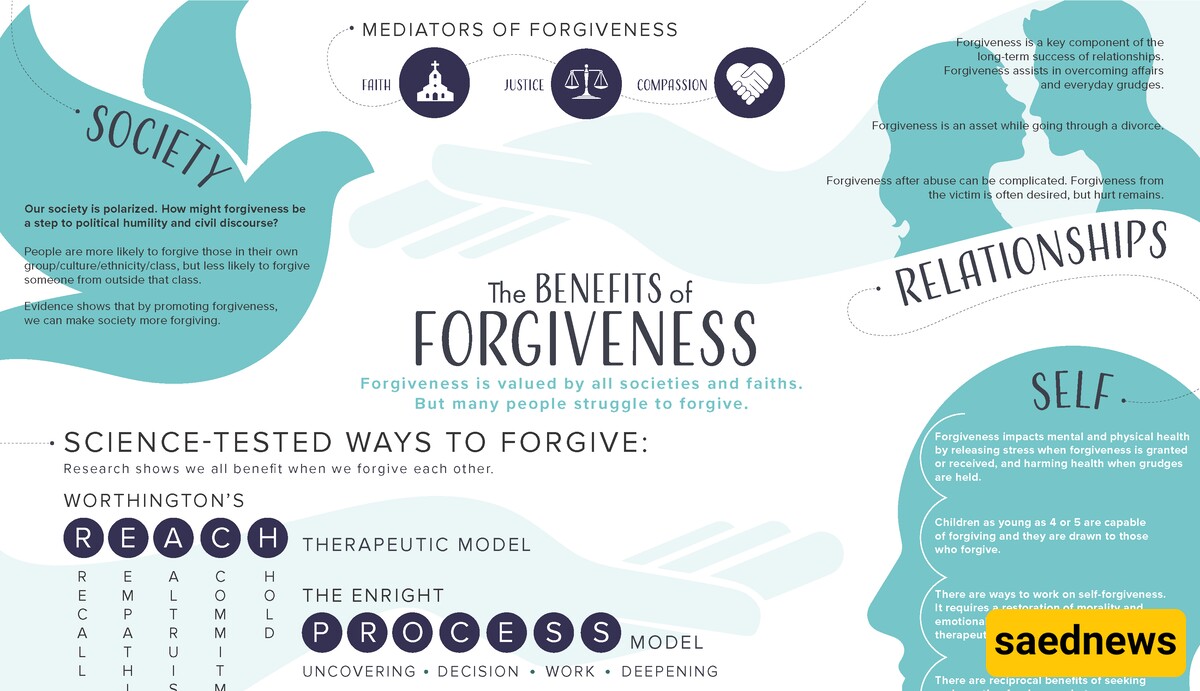SAEDNEWS: Forgiveness is frequently interpreted as an act of generosity toward others. But, in reality, we are giving ourselves a significant gift.

According to SAEDNEWS, holding onto anger or resentment may be both emotionally and physically draining. However, learning to forgive may set us free, allowing for serenity and progress. Forgiveness does not imply tolerating poor behavior or ignoring the damage. It's about releasing emotional baggage and recovering your power.
This blog discusses how forgiveness can be a learning experience and offers practical techniques for embracing this transforming process.
Carrying animosity is like carrying a hot coal and preparing to fling it at someone else. In the end, you're the one who is burnt. Unforgiveness can emerge in a variety of ways, including tension, worry, and even health difficulties. Studies have shown that carrying grudges can raise blood pressure and damage the immune system. Consider Sara, who could not forgive a coworker for undermining her at work. Her hesitation to let go eventually sapped her vitality, impacting her job performance and relationships. Sara only recovered her attention and emotional equilibrium when she chose forgiveness.
Forgiveness is not about accepting poor behavior or pretending the pain did not occur. Instead, it's about separating from the suffering and regaining your peace of mind. There are two kinds of forgiveness:
1. Decisional Forgiveness: The intentional decision to let go of wrath and bitterness.
2. Emotional Forgiveness: Overcoming the emotional effect of the hurt over time.
Both are necessary, but emotional forgiveness typically takes longer. The path is very personal, requiring patience and understanding.
Emotional freedom - Forgiving someone relieves you of the load of wrath and hatred. It enables you to go forward unencumbered by previous pain.
Better Relationships - Forgiveness promotes empathy and understanding, opening the door for better relationships.
Better Health - Getting rid of grudges can reduce stress, enhance sleep, and promote general well-being.
Personal growth - Forgiveness promotes resilience and empathy. It helps you recognize that everyone, including yourself, has flaws and may make mistakes.
Forgiveness and learning go hand in hand. Every painful event has a lesson, whether it is about limits, communication, or self-awareness. Take Ali (an engeneering student) for example. He struggled to forgive his best buddy for breaking his trust. Through introspection, Ali understood that the event had taught him the value of setting limits and respecting his own sentiments. By focusing on the teachings, Ali transformed his grief into a tool for personal development.

1. Acknowledge Your Pain
Before you forgive, acknowledge and affirm your emotions. It is OK to feel wounded, angry, or deceived. Journaling or speaking with a trusted friend might help you process your feelings.
2. Understanding the Offender's Perspective
Empathy does not excuse poor action, but understanding the offender's viewpoint might help you see the broader picture. People often behave out of anguish or ignorance.
3. Decide To Forgive
Forgiveness begins with a decision. Decide to let go of your anger and focus on healing. Remember that this decision benefits you, not them.
4. Find the Lesson.
What did your experience teach you? Perhaps it's about creating clearer limits, communicating more effectively, or identifying red signs early.
5. Release the Emotional Hold.
This process requires time. Meditation, therapy, and visualization are all techniques that can help you escape the emotional grasp of the trauma. Imagine severing the chord that connects you to the suffering.
6. Practice self-forgiveness
Forgiving oneself is as vital. Acknowledge your mistakes, learn from them, and let go of any guilt or shame.
7. Recognize how far you have come.
Forgiveness is a process, and each step forward demonstrates your strength and perseverance.
Forgiveness is not always simple. You may struggle with repeated anger or believe that forgiving makes you weak. These problems are common, but they may be overcome with the appropriate approach.
1. Overcome Anger - It's normal to get angry, but don't let it control you. Direct it toward something constructive, such as exercise or artistic expression.
2. Addressing the Fear of Vulnerability. - Forgiving doesn't imply that you have to trust the individual again. Set limits to protect yourself while simultaneously letting go of resentment.
3. Addressing Repeated Offenses - If someone continues to hurt you, forgiving may imply stepping away. Forgive for your peace, but prioritize your own well-being.

Mindfulness allows you to remain present and disconnect from traumatic recollections. Apps such as Headspace and Calm provide guided meditations on forgiveness. A therapist can offer a secure environment in which to process emotions and build coping mechanisms. Desmond Tutu's The Book of Forgiving and Dr. Fred Luskin's Forgive for Good provide helpful thoughts and approaches.
Nelson Mandela - After 27 years in jail, Mandela forgave his oppressors and guided South Africa to peace. His narrative reveals how forgiveness may heal not only people but entire civilizations.
Marina, a childhood trauma survivor, embraced forgiveness as a means of reclaiming her life. By letting go of resentment, she discovered serenity and purpose, and she became an advocate for others going through similar experiences.
Ripple Effect of Forgiveness
Forgiveness benefits not only you, but people around you as well. When you forgive, you encourage others to do the same, causing a chain reaction of healing and understanding. Consider a business where coworkers settle disagreements via empathy, or a family where forgiveness builds stronger relationships. When we choose to let go of our anger, we make the world a better place.
Forgiveness is not about forgetting or excusing; it is about breaking free from the bonds of anger. It's a voyage of self-discovery and progress, with vital lessons along the way. You may turn grief into strength by expressing your feelings, understanding the offender's point of view, and focusing on the lessons. Remember that forgiveness is a gift to yourself—it leads to serenity, resilience, and a better future. So, whom will you forgive today? Take the first step and observe how it changes your life.

